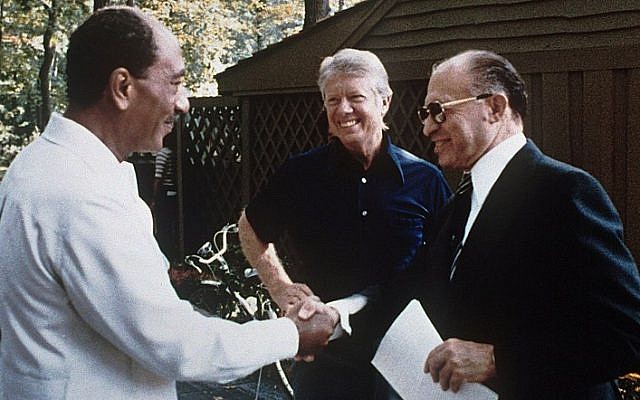Israel and Egypt to Mark 40 Years of Peace
Israel and Egypt are set to celebrate a big anniversary on March 26, 40 years since the signing of the formal peace treaty in 1979.

Israel and Egypt are set to celebrate a big anniversary on March 26, 40 years since the signing of the formal peace treaty in 1979. With President Jimmy Carter looking on, the treaty, signed by Egyptian President Anwar Sadat and Israeli Prime Minister Menachem Begin, was made official at a ceremony at the White House.
Just 16 months earlier, Sadat had travelled to Jerusalem, breaking with custom for most Arab leaders and angering much of the Muslim world at the time. From there he and Begin met a second time, in the United States, ironing out the basics of a deal at the historic Camp David Accords.
Begin and Sadat were joint recipients of the 1978 Nobel Peace Prize, and Egypt’s membership in the Arab League was revoked for 10 years as results of the agreement. In 1982, the two former enemies established full diplomatic relations, making Egypt the only state to recognize Israel until 1994, when Jordan did the same.
Now, on the verge of a ruby anniversary for the landmark deal, a few of the power players who helped to orchestrate the arrangement are looking back and to the future to examine its lasting impact.
Former U.S. Ambassador to Israel and Egypt Dan Kurtzer spoke to The Jerusalem Post last week and discussed the importance of that deal to the status of diplomacy in the region since.
He said that Sadat was keenly aware of Israeli security concerns in the negotiations and, as a result, was willing to be more flexible regarding regulation of Egyptian forces and munitions in the Sinai in the treaty.
“If you look at the treaty, there are three zones – A, B and C – and Egypt is not permitted to send its forces into zones closest to the Israeli border. … [It] has limitations on what it can do in the other two zones, including not only the number of forces but also the type of weaponry and quality of installations,” he told the Post.
He also said that while security provisions were a key aspect of the treaty, where it fell short was in not including more parties. Kurtzer said that Palestinian leaders missed out by not participating in the talks, instead boycotting Israel “in shock,” and that their participation may have preempted disagreements that would later come up at, and impede, the Oslo conferences.
“There was an excitement factor that was present in ’79 that could have been taken advantage of,” he added.
Also reminiscing this week is President Jimmy Carter, who is in Israel to mark the 40th anniversary. He spoke in an interview with Israeli journalist Tali Lipkin-Shahak to be aired at a conference at Hebrew University of Jerusalem this week. Excerpts from the interview were aired March 4 on Channel 12.
“I would like for the Israelis to know that my number one goal in life would be for Israel to be able to live at peace with all her neighbors,” Carter told the reporter.
He also reflected on the groundbreaking agreement, saying that, “in the 13 days that we had available, I think we did the best we could.”
Carter remembered fondly his counterparts in the peace process.
“Sadat was very courageous, he gave his life to an assassin as you know, and prime minister Begin was the most courageous of all, because he made the most difficult concessions in Camp David to reach an ultimate agreement,” he said.
The 94-year-old Carter also criticized modern leaders on both sides of the Israeli-Palestinian conflict, saying that he doesn’t believe that peace is possible as long as Benjamin Netanyahu is prime minister.
He added that he’s “not sure” Palestinian Authority President Mahmoud Abbas wants peace either.
At this point, Carter does not often wade directly into politics, instead he focuses much of his effort on humanitarian work, but he did address the U.S.’s complicated role in settling disputes.
“And you don’t have a trusted mediator who can bridge the gap and secure the step-by-step small concessions that are necessary for accommodation,” Carter said.
He also said he was contacted by President Trump’s son-in-law, Jared Kushner, for advice on his to-be-released peace plan.



comments